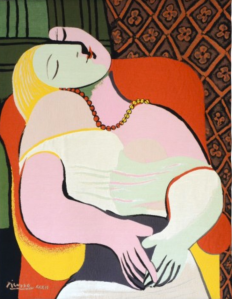Some things have confused me for a long time, such as why flowers are beautiful and spiders are not. What is beauty anyway? And is there any importance in asking or answering that question?
Obviously, there are some people who find spiders beautiful (yes, really), so the quality is not inherent in the object. I lost my father after a long illness and was thinking about my loss while walking to the mailbox. A crop of slender blue wildflowers on the road’s edge, caught my eye, their beauty an instantaneous salve to my grief.
How? Why?

Somewhere in the heart of a forest, an exquisite orchid is blooming, and no one is there to see it. Is it beautiful? No. Beauty is, indeed, in the eye of the beholder. Without the eye, it does not exist. The orchid exists, of course, but it is not “beauty” to the creatures that see or smell it, even those insects that it is meant to attract. (I should caveat with “as far as we know,” because we are learning that our ideas of awareness and even intelligence may extend in some manner to the plant world and certainly to the animal world, but most likely the concept of “beauty” is a human construct.)
This means if no human notices the wildflowers and deems them beautiful, they are just wildflowers doing their thing. Without a human observer, there is no “beauty.’
A sense of responsibility follows this thought. Nature is harsh, relentless change. It is “eat and be eaten.” A frog makes no distinction between a caterpillar and a butterfly as far as lunch is concerned. In our stellar neighborhood, two galaxies are colliding, gravitational forces ripping apart whatever life may have painstakingly evolved. Our own galaxy is destined to collide with another, our sun to die, our loved ones, ourselves.
We may learn that whales or elephants or other animals share our awareness of mortality, but, as far as we know now, people are the only creatures to seek meaning to life, perhaps because of that awareness. It is a burden. It is a privilege. In this chaos of change we call life, humans seek meaning, personal meaning.
The concept of beauty may be one of the unique perceptual structures of the human brain. Why did it evolve? Of what evolutionary value is it? Is it just that spiders pose a threat, so we instinctively recoil from them, while flowers pose no threat and may signal a source of food? Perhaps, but some people truly find spiders fascinating and beautiful. There are spider enthusiast groups. Honest. And I have to admit, I found one that gleamed with sparkly gold sitting on a fabulously complex web yesterday. So beauty is a learned thing.
Perhaps the concept of beauty is just an odd byproduct of the complexity of our minds, our thought processes. Or perhaps not. Perhaps it came into being to give us something we crave—meaning. I have been told that my book, Noah’s Wife, was “beautifully written.”
This was welcome feedback, but puzzling. The story is told from the unique perspective of a young woman with what we now call Asperger’s Syndrome. She sees the world in literal terms. Looking at her straightforward words on the pages, I was befuddled at how they could be considered “beautiful.”


But perhaps it is not the words themselves, but the fact that they create meaning for some readers, truths about being human, and that renders them beautiful, in the same way that Picasso’s art is beautiful to some eyes. His paintings force us out of our typical perceptions, whispers in ways we may not be able to voice, even disturbs, but speaks the language of meaning and (some) find that beautiful, even in the harshness or starkness of his lines, just as some find beauty in abstract art or different types of music . . . or spiders.
Beauty is observable by all our senses, including our ability to see a beautiful act of kindness or a beautiful scientific formula. If we are uniquely capable of determining beauty, then we have a responsibility to see it, to open our eyes to it, to find meaning in it, our uniquely human meaning.
T.K. Thorne writes about what moves her, following a flight path of curiosity, reflection, and imagination. Check out her (fiction and nonfiction) books at TKThorne.com


Your comments about beauty inspired me to write something. I don’t know if anything is so beautiful as some of the spider webs I have seen. Any creature that can spin something so beautiful must have beauty within its soul(does a spider have a soul?}. When I was a young teenager I studied dance with a young woman whose sister, Robin, was one of Martha Graham’s dancers. Robin was very beautiful. Her sister Mary considered herself to be ugly. Mary had an ordinary face and a lovely body. When she danced her movements were enchanting. She radiated beauty. To me she was one of the most beautiful people I knew. I loved her dearly. Beauty IS in the eye of the beholder.
Harriet
Thank you for sharing that lovely story and observation, Harriet. I think knowing that finding beauty is within us allows us to be open to it in place we might never look.
the eyes tht see the beouty of the nature is more beoutiful thn the nature fathermore the beouty the nature is the medecine of the eyes thnks for sharing the pross
Thank you for stopping by and for your beautiful comment. I agree!